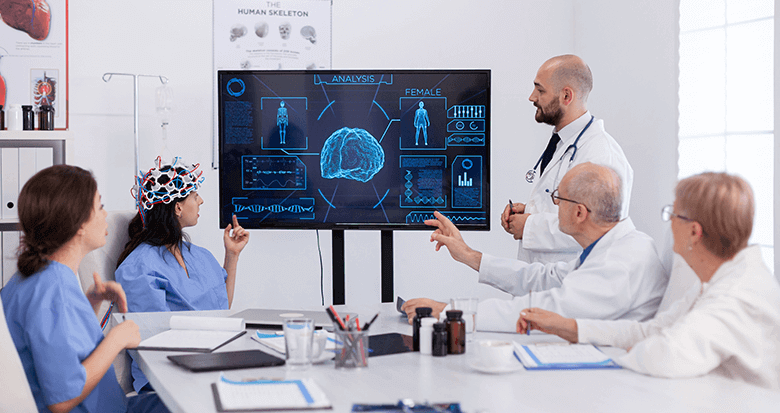Clinical Trial Management
Clinical trials are a cornerstone of medical research, essential for evaluating the safety and efficacy of new treatments, drugs, and medical interventions. Effective management of these trials is crucial to ensure their success and, ultimately, the well-being of patients involved.

Program Highlights

Modules-
10

HRS of Learning-
300+

Weeks -
6

FAQs-
150+

Mock Interview FAQs-
100+

Program Overview
The Clinical Trial Management course is designed to provide participants with a comprehensive understanding of the principles, processes, and best practices involved in planning, conducting, and overseeing clinical trials. Through a combination of theoretical knowledge and hands-on practical training, participants will acquire the skills necessary to navigate the complex landscape of clinical research while adhering to regulatory standards and ethical guidelines.
Program Objectives
- Provide a solid foundation in the fundamentals of clinical trials, including phases, key stakeholders, and regulatory framework.
- Enable participants to develop robust study protocols, informed consent procedures, and selection of relevant study endpoints.
- Familiarize participants with the ethical considerations and regulatory requirements governing clinical research, emphasizing adherence to GCP guidelines.
- Train participants in the identification and qualification of clinical trial sites, along with initiation, activation, and ongoing site management.
- Equip participants with strategies for effective participant recruitment and retention, as well as best practices for obtaining informed consent.
- Provide hands-on training in designing case report forms (CRFs), data collection, entry, validation, and quality assurance procedures.
- Instruct participants on the proper handling and reporting of adverse events, safety monitoring, and signal detection.
- Train participants in developing monitoring plans, executing site visits, and conducting risk-based monitoring. Emphasize quality control and assurance practices.
- Provide participants with the skills to develop and negotiate study budgets, track expenses, and manage financial resources effectively.
- Instruct participants on the steps involved in closing out a clinical trial, preparing final study reports, and disseminating results.
- Explore emerging trends, adaptive trials, patient-centered trial design, and the integration of technologies in clinical research.

Target Audience
- Medical graduates with MBBS, MD, DO, Ph.Ds',
- Dental graduates with BDS, MDS, DMD, DDS
- Pharmacy graduates with B.Pharm, PharmD
- Ph.D
- Nursing graduates with RN, BS, LPN
- Majors in Biological Sciences/Life Sciences/allied health fields
- Pharmaceutical Quality analysts
- Microbiology, Biochemistry, Organic Chemistry and Biotechnology students
.
- Health Informatics
- Regulatory affairs
- Medical Affairs
- Clinical Research
- Clinical Data Management or Data sciences
- Clinical Trial Management
- Quality Assurance
- Quality Control
- Pharmacovigilance and Drug Safety
Program Curriculum
Designing a comprehensive curriculum for Clinical Trial Management involves structuring a program that covers key theoretical concepts and provides hands-on training in practical skills. Here's a suggested outline for a Clinical Trial Management curriculum:

- Definition and Phases of Clinical Trials
- Historical Perspective and Evolution of Clinical Research
- Ethical Considerations and Regulatory Framework (e.g., ICH-GCP)
- Stakeholders in Clinical Trials (e.g., Sponsor, Investigator, CRO)
- Responsibilities of Clinical Trial Personnel
- Delegation of Duties and Study Team Dynamics
- Study Protocol Development and Review
- Informed Consent Process and Documentation
- Study Endpoints and Outcome Measures
- Institutional Review Boards (IRB) and Ethics Committees
- Regulatory Submissions and Approvals
- Adherence to GCP Guidelines and Local Regulations
- Site Identification and Qualification
- Site Initiation Visits (SIV) and Site Activation
- Site Training, Monitoring, and Close-Out Visits
- Patient Recruitment and Retention Strategies
- Informed Consent Process and Documentation
- Handling Vulnerable Populations and Special Considerations
- Case Report Form (CRF) Design and Development
- Data Collection, Entry, and Validation
- Source Data Verification (SDV) and Data Quality Assurance
- Adverse Event Reporting and Safety Monitoring
- Serious Adverse Event (SAE) Handling and Reporting
- Safety Data Management and Signal Detection
- Monitoring Plan Development and Execution
- Risk-Based Monitoring (RBM) and Centralized Monitoring
- Audits, Inspections, and Corrective Action Plans
- Budget Development and Negotiation
- Expense Tracking and Financial Reporting
- Cost Allocation and Resource Management
- Study Close-Out Procedures and Documentation
- Final Study Report Preparation
- Dissemination of Results and Publication Ethics
- Adaptive Trials and Master Protocols
- Patient-Centered Trial Design
- Emerging Technologies and Trends in Clinical Research
- Quizzes and Knowledge Checks
- Practical Exercises (e.g., Protocol Review, Informed Consent Simulation)
- Group Projects and Presentations
- Final Exam or Capstone Project
- Guest Lectures from Industry Experts
- Mock Site Visits and Monitoring Scenarios
- Regulatory Affairs and Compliance Workshops
Remember to adapt and update the curriculum to incorporate the latest technologies, regulatory guidelines, and industry best practices in Clinical Trial Management.
Career Paths
Clinical research encompasses a broad range of roles and responsibilities within the field of medical research. Here are various career paths you can pursue in clinical research:
- Responsibilities: Assist in the planning and execution of clinical trials, ensure compliance with protocols, coordinate patient recruitment and data collection.
- Skills Needed: Attention to detail, knowledge of regulatory guidelines, strong organizational skills.
- Responsibilities: Assess and evaluate adverse event reports for causality and seriousness, provide medical expertise in safety assessment.
- Skills Needed: Medical background (e.g., PharmD, MD), clinical knowledge, analytical skills.
- Responsibilities: Oversee pharmacovigilance activities, ensure compliance with regulatory requirements, lead safety teams.
- Skills Needed: Leadership, regulatory knowledge, project management skills.
- Responsibilities: Develop and implement risk minimization strategies, conduct benefit-risk assessments, and oversee risk management plans.
- Skills Needed: Risk assessment, regulatory knowledge, communication skills.
- Responsibilities: Ensure compliance with quality standards, conduct audits and inspections, implement quality management systems.
- Skills Needed: Quality assurance knowledge, auditing skills, attention to detail.
- Responsibilities: Liaise with regulatory authorities, ensure compliance with pharmacovigilance regulations, and support regulatory submissions.
- Skills Needed: Regulatory knowledge, communication skills, attention to detail.
- Responsibilities: Analyze safety data to identify potential signals, perform benefit-risk assessments, and contribute to risk management strategies.
- Skills Needed: Analytical skills, statistical knowledge, pharmacovigilance expertise.
- Responsibilities: Conduct safety assessments in clinical trials, contribute to study protocols, and provide safety-related guidance.
- Skills Needed: Clinical research knowledge, medical background, analytical skills.
- Responsibilities: Provide training on pharmacovigilance principles, regulatory requirements, and case processing procedures.
- Skills Needed: Communication skills, knowledge of pharmacovigilance practices.
- Responsibilities: Offer specialized pharmacovigilance services to pharmaceutical companies, regulatory agencies, or research organizations.
- Skills Needed: Expertise in pharmacovigilance, business acumen, networking skills.
- Responsibilities: Analyze safety data, perform statistical analyses, and generate safety reports.
- Skills Needed: Statistical knowledge, data analysis skills, pharmacovigilance expertise.
- Responsibilities: Manage pharmacovigilance databases and IT systems, ensure data integrity and security.
- Skills Needed: IT skills, database management knowledge, attention to detail.

Remember, these career paths often have room for advancement, specialization, and crossover into related fields like regulatory affairs, clinical research, or quality assurance. Continuous learning and staying updated with industry trends and regulations are crucial for success in Pharmacovigilance.
